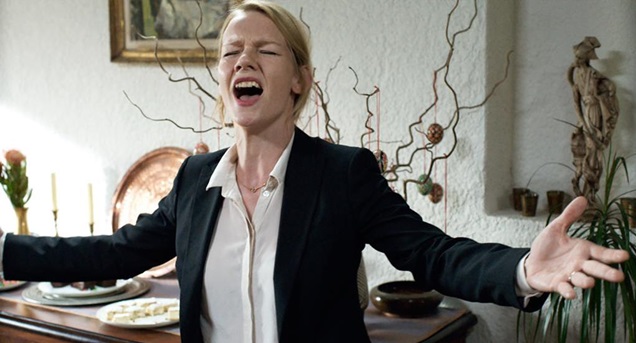
Maren Ade’s Toni Erdmann is one of those brilliant movies that you have to see for yourself in order to understand where all of the talk about it has been coming from – and once you do, you’ll realise what ‘the fuss’ was all about.
On the surface, Toni Erdmann is a relatable story of a retired father, Winfried (Peter Simonischek), an innocent prankster at heart, who decides to pay a surprise visit to his workaholic and always-on-the-phone daughter Innes (Sandra Huller) who is stationed in Romania, in order to revive their estranged relationship. As expected, however, the visit doesn’t go well as Innes’ job and Winfried’s awkward manners clash to prevent the two from re-bonding.
Winfried is bound to return to Germany, and thus, voilà, Toni Erdmann appears – or to be more precise, the same old Winfried propped with a scruffy wig, a tacky purple suit and a pair of false teeth as he puts on an embarrassing masquerade to dazzle Innes, her friends and co-workers pretending to be a big and successful life coach as he tries to comically make his way into his daughter’s life and to help her with the pursuit of happiness by loosening her up.
But behind the surface of a brilliant story lie the even more brilliant deep and meaningful messages that are subtly wound into the heart-warming humour, bound to make one think of the bigger questions at hand – on both a personal and social level.
It is no wonder that the movie got so much attention and has been in the much deserved spotlight ever since its premiere in Cannes in 2016, paving its way through the striking victories from all around the world and leading up to its most recent nomination at the Academy Awards, the results of which are yet to be announced.
It is no doubt that Toni Erdmann has risen to be part of the high society of cinema that will be remembered for years to come, raising the bar not only to Maren Ade’s next masterpiece but also for the announced Hollywood remake; and so, here are the reasons making Toni Erdmann an essential cinematic accomplishment that is still sweeping audiences off their feet as it steadily makes its appearance in premiers around the world.
1. Outstanding Cast and Performances

The fact that the two actors in the lead roles haven’t previously gained such international success as they have with Toni Erdmann makes them quite unrecognisable to the common audience, leading to us having no expectations of their performances or associations with their previous roles, making them something of a blank slate and the true embodiment of the two fictitious characters. And after seeing them play the parts with such immaculate credibility and chemistry, one can only question why we haven’t been exposed to these two faces before.
Peter Simonischek masterfully takes on the challenging role of Winfired Conradi and all of the imaginary personas that come under the name, including Toni Erdmann. The biggest demand of the role was being not just a comedian, but a serious comedian behind whose pranks and fart cushions lies a big heart that is filled with pain and longing that is not obvious at a first glance. Simonischek subtly introduces these elements without the need of long monologues and sometimes even in a full body costume that consumes even his face, showing the true craft of acting.
The daughter of Winfried, Ines, is played by Sandra Huller, who like her father is a master at concealing painful emotions. While Simonischek’s character is putting on an obvious show, Huller is performing in a show of her own – difference being that her show is her own life.
From the beginning of the movie we see Huller and Ines put on the face of a serious businesswoman, forced to smile at people she dislikes and be cold to people she does like in order to maintain her appearance and job that is threatened by male presence. But as the movie progresses we see cracks and flaws in her performance – that is of Ines’s performance, as Huller’s is unquestionably perfect.
2. “Classical Comedy”
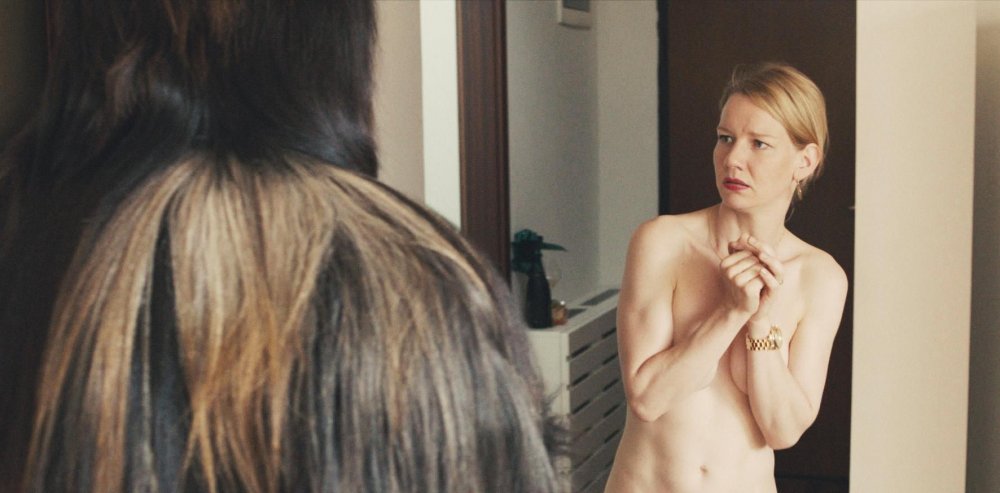
One of the elements that make Toni Erdmann an outstanding piece of cinema is its use of comedy; not just in the sense of how it uses this genre, but what kind of comedy is implied.
Although it can’t be said that Maren Ade’s film will leave you in stitches from the witty jokes, the humour indeed being 5 star, ranging from tiger toilets to team building exercises you’re bound to remember. Putting this aside, however, the comedic element overall goes a lot deeper, and in style is nothing like the slapstick humour we experience too often today.
Ade’s genre is more of a reflection of the original comedy that started out in Ancient Greece, when their sharp satirical plays were used to present political situations, described with the familiar element of placing two groups of people with opposite views in a humorous conflict which is exactly the game played between father and daughter.
And the film is indeed more cunningly satirical rather than plain comical as every joke comes with intention other than simply the sake of making a joke. Every naked joke made and every humorous scene played is used as a form of social or personal critique which combined with dramatic irony cause a wonderful collision of the funny side of the quite tragic reality.
3. Balance between Drama and Humour in the time frame

Considering the genre of comedy mentioned previously it is inevitable that Toni Erdmann is also in a sense a drama, taking into account the seriousness of the message and themes at hand. What is a huge accomplishment to Maren Ade, is her ability to craftily mix and blend the two genres without the movie being overloaded with either one or the other; she puts us on an engaging roller coaster of tears from two very opposite emotions – laughter and emotional compassion.
Even the ending itself is quite bittersweet as although the father daughter relationship could still do with a few more stitches creating a sense of sadness, it is quite hopeful that Ines evidently is in hope of embracing her father’s ‘quirk’ as well as the funny side of life.
This blend is particularly important considering the fact that the movie is close to 3 hours (162 minutes) and therefore a step to the left or right could have made the movie drag on. The reason why this never occurs is firstly because of the drama-comedy balance that doesn’t allow us to stick to one emotion which can be quite burdening.
Apart from this, Ade makes it work by creating peaks at several stages, each one being a build up from the previous and always a surprise, giving the audience just enough breathing space to enjoy themselves but not too much that they daze off. The climax of the movie, in the form of Ines’s extravagant cover of a famous ballad that is better seen than told about, doesn’t lead to a fading effect but only sparks curiosity for what is yet to come.
4. A critique on Europe
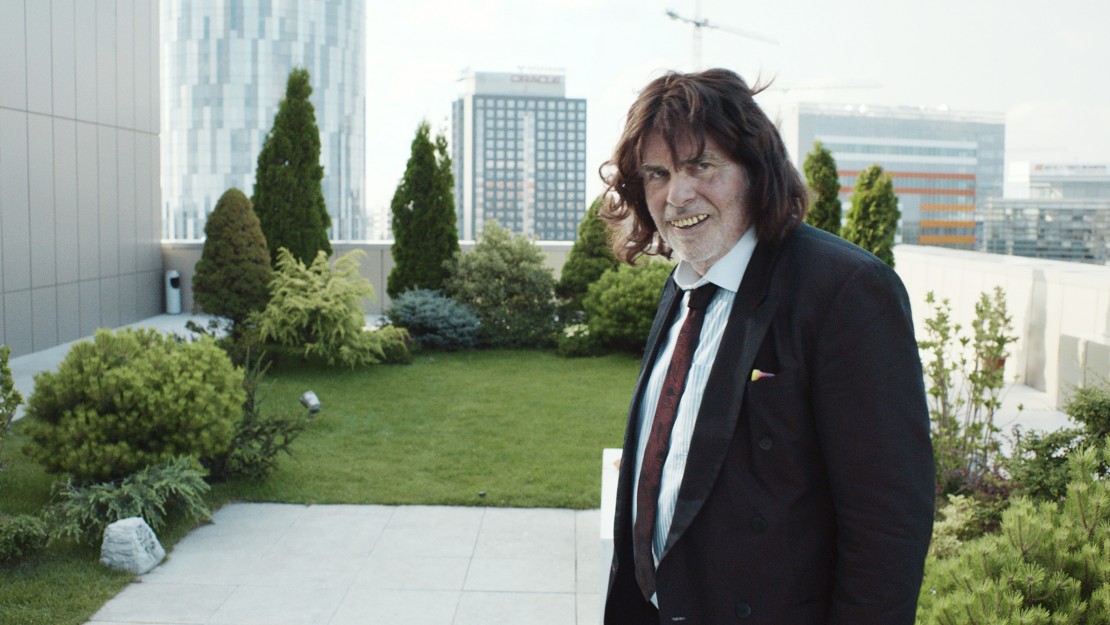
Films whose story includes critical context are always bound to be a success; and Maren Ade definitely put a lot of criticism into the comedy. One of such important critiques is that on Europe, more specifically on its extreme modernisation that has led to more ‘modernised’ countries enforcing their power to change countries they think are falling behind; but this always comes at a price.
The greatest image to portray this is Ines looking out of the balcony of her expensive modern apartment over the so called slum area, highlighting the differences between the old and the new as well as the financial difference between the two. The fact that Ines’ job itself is for a consulting agency aimed at modernisation set to cut down costs, in Ines’ current assignment, for a Romanian oil company just furthers the matter.
What is vital here is the critical representation of the new and modern not always being in the right, as Ines heartlessly proclaims, in spite of her father’s opposition, that the company could do with a big staff cut despite the tragic effect it will have on the people that will lose their jobs – which is in fact something that the executives of the company know must be done but are afraid to do until Ines bravely proposes it, as not to be the ‘bad guys’.
5. Critique on our anti-comic society and a lesson on happiness
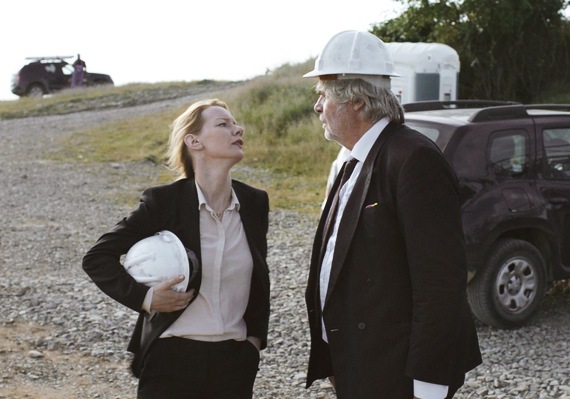
One of Maren Ade’s critiques that is played throughout Toni Erdmann using the brilliant humour, that is definitely a lesson for us all, is that of our anti-comic society. People have become too materialistic and obsessed with things that arguably don’t matter. Ines herself evidently falls into the trap of being hit by the whirlwind of the busy world, causing her to become obsessed with her job and status of a businesswoman with her only real friend being her mobile phone.
She is constantly under pressure and even the job that she seems to like and that she is doing so well in is a constant battlefield where she is forced to wear a mask and armour so as not to get hurt or be pushed down.
This is exactly why her father, Winfried, feels it his duty to save the girl from both the world and from herself as he seems to be the only figure who truly appreciates the happiness of little things, despite obviously not being completely happy himself. He wants Ines to let go of her worries for they are the things stopping her from living.
And indeed little by little Windried succeeds to melt away a small portion of the ice wall Ines has built around herself, as she begins to hide little smiles of laughter at her silly father and eventually pulls quite a dramatic stunt herself, demonstrating that untroubled and innocent happiness can in fact, despite the struggle, coincide with the fast moving modern world.
6. Spotlight on a female director and feminist issues
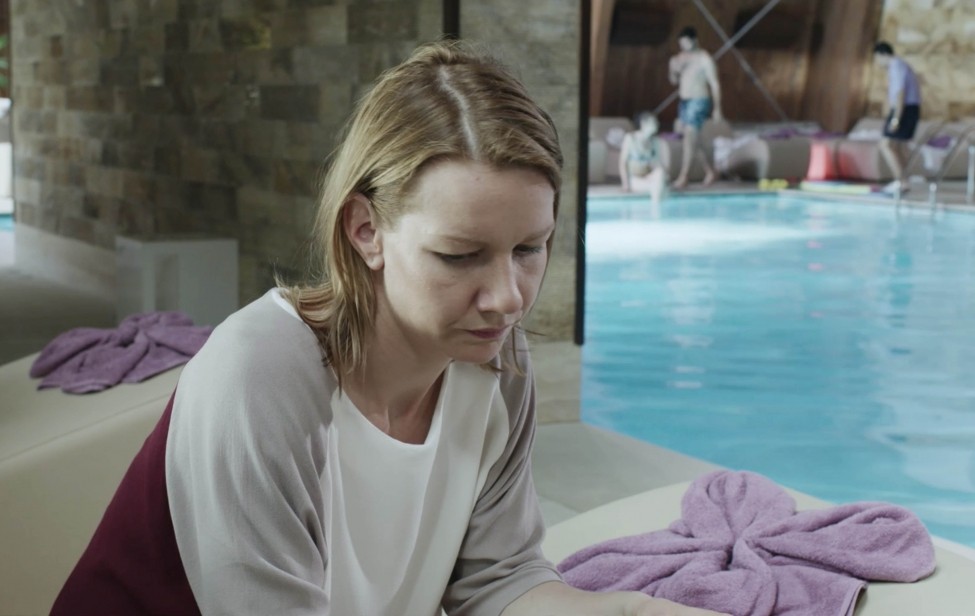
Maren Ade’s success with Toni Erdmann has been tremendous, claiming glorious victories in many international festivals around the world. Despite our day and age there are still less women working behind the camera in comparison to men, with quite a shocking difference, therefore the spotlight that has been placed on Toni Erdmann has definitely raised awareness in regards to women in the industry.
Apart from that, Ade shows critique of sexist issues through the character of Ines, particularly in regards to her workplace. We constantly see how she is under threat from her male co-workers and clients of not being taken as seriously as a male equivalent, introduced from the very first work scene we encounter where she is asked to take a potential client’s wife shopping, degrading her status of a businesswoman and professional.
This relevant theme is seen throughout and helps to even further underline Ines’ struggle with the corporate world and pressures, not only in regards to the work itself that forces her to mask her true self, but also in regards to her sex that seems to push her even more.
Author Bio: Polina is an aesthete and cinephile, devoted to using the arts to revive “sex, drugs and rock’n’roll” in hopes of loosening up the world by defying the unnecessary social restrictions. When taking time off her edgy crusade she can be found soaking in a bubble bath with a Dostoevsky novel.